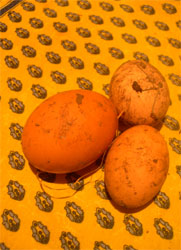Caring for your eggs
Posted by Fiona Nevile in Chickens | 38 comments If the weather is wet or you have a chicken roosting in the nesting box, it’s important to collect your eggs every morning and evening. The shells of eggs are porous and the eggs can become tainted very quickly. In wet weather, our hens get muddy no matter how much gravel I spread in the run.
If the weather is wet or you have a chicken roosting in the nesting box, it’s important to collect your eggs every morning and evening. The shells of eggs are porous and the eggs can become tainted very quickly. In wet weather, our hens get muddy no matter how much gravel I spread in the run.
The mud sticks to their claws and legs. With the exception of Mrs Boss, who tends to turn brown in wet weather. Her companion Pekin Bantam remains a glorious sparkling white. We were initially briefly concerned. Was Mrs Boss preparing for The Great Escape? After a few years, we know better. Mrs Boss has an adverse reaction to ablutions.
When chickens venture into the nesting box to lay an egg, the mud is transferred from legs to eggs. Wash muddy eggs in cold water and if they need a rub, use a throwaway towel, such as kitchen roll. If you clean out the nesting box regularly, you can easily tackle most of this problem at source. One of our hens, Garbo, has roosted in the nesting box for years.
Droppings can be a problem. We clean the coop out once a week but when I collect the eggs each morning I remove Garbo’s droppings from the nesting box. An old trowel lives on the roof of the hen house. It’s there for scraping out the main dormitory but comes into its own in this instance. We have a bucket with a lid in the run for collecting this stuff.
If you have everything that you need for the chickens in an accessible place in the run, you will save hours over the course of a year. Chickens are easy if you put a bit of thought into their maintenance,
My next project for the chickens is to fit guttering along the roof of the coop. They seem to prefer rainwater to tap water. They would be thrilled If the rainwater was collected into a shallow trough.
If you plan to collect water from the chicken coop roof beware of open water butts. Chickens belonging to friends have drowned in them.
Leave a reply





Hi i have ten hens in two different coops. Two of my chickens came down with lice which i have got rid of using lice powder i now put the powder over the straw and saw dust each time i clean them out which is twice a week as dirrected by the instructions on the tin. I read about red mite and how to treat this and keep it at bay. Do you treat the coop every time you clean it out or just if you should be unlucky enough to get them. i would be greatful of anyones input in this matter. thanks
Hello,
I have been enjoying reading your posts about chickens. I have had various ups and downs with mine (I now have 13 layers of different breeds). I just wanted to say that my chickens LOVE bananas! I buy them regularly anyway and when some get too ripe to eat, I peel them and give them to my chickens as a treat.
cool thanx for info
Hi Pete
We have a combination of elderly maidens and one younger guine fowl hen. We waved goodbye to eggs in October so we smiled at your enquiry.
If you leave a light in the hen house/ have very young laying hens/real 20/20 layers they have stoped laying because every living being needs a holiday once in a while. December 21st is approaching (the shortest day). After this date hens perk up and within ten/fifteen days uually start laying again.
Thanks for advising Mandi, much appreciated.
hi mandi ,if i may share with you what i do for my hens muddy feet , ive stopped using a feeder and scatter the hens feed in the bottom of the house and cover it with straw they naturally scratch about to get at the feed which brushes there feet , when this straw is a mess i rake it out into there run just outside there door sort of like a hen doormat this then gets thrown away
hi , things have been going well with my hens for a while now , but all of a sudden theyve all stopped laying , i know they produce less in the winter but theres been no eggs now for a week , is it just the colder weather and short daylight or should i start thinking bout treating them for egg bound symptoms any advice aprreciated
Hi Mandi
Our chicken run gets very muddy in the winter months so we spread gravel over the surface and this seems to do the trick. It also entertains the chickens as they enjoy scratching about in the gravel.
It can’t be good for chickens to be walking in wet mud all day.
can I have some opinion / advice on a muddy chicken run. Our pen is quite large but over the past month has become incredibly muddy. should I be worried about the hens walking around in this – someone told me I should examine their feet.